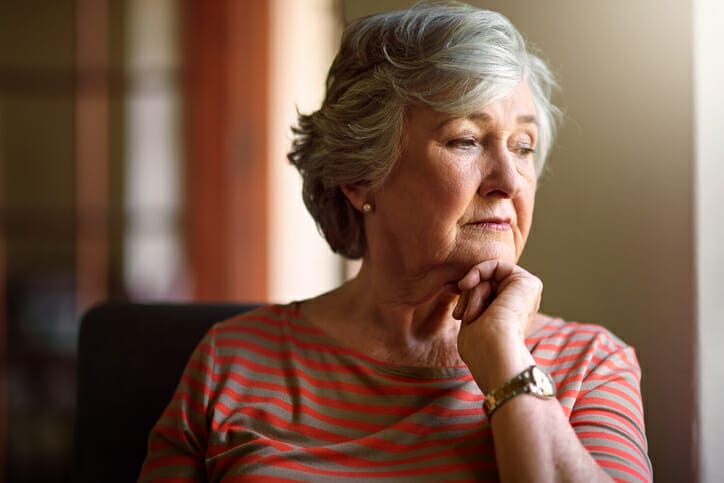If a senior you love is behaving differently or seems hopeless, it’s possible that their symptoms could be a sign of senior depression. Many people may experience periods of depression during their lifetimes, but depression isn’t a regular part of aging. Depression can happen to anyone at any age—even people who seem like they have wonderful lives. Depression can develop slowly or as a result of a major life change, such as retirement, loss of a loved one, health issues, or chronic illness. If an older adult you love is experiencing senior depression, they do not have to stay miserable! Help is available, and there are many things you can do together to help the senior feel happier and enjoy life more.
Causes of Senior Depression
Many older adults may not realize that their symptoms could be caused by depression because they assume their feelings are just a regular part of aging. They may overlook the signs or feel too afraid to discuss their feelings. Many seniors do not seek help. Senior depression is common, especially since older adults often experience significant life changes. Some of the factors that contribute to depression include:
- Isolation and loneliness. Older adults may live alone or be more isolated from family and friends. Their symptoms may go unnoticed, and they may be suffering from loneliness.
- Illness and disability. Changes in health, injury, chronic pain or illness, surgery, physical limitations, or cognitive decline may lead to depression.
- Insecurity or fears. Having fears about death, surgery, health issues, or financial insecurity can be very upsetting. Some older adults may be depressed as a result of neglect or abuse.
- Loss of loved ones. It is natural to go through a grieving process when losing a spouse, family member, friend, or pet. While grieving, emotions change frequently with a mixture of good days and bad. Grief can lead to persistent sadness or feelings of loss that don’t lessen in time.
- Loss of purpose. Seniors may feel that the meaningful and active part of their lives is over after retirement. Others may struggle with the loss caused by physical or cognitive limitations that prevent them from doing the things they once loved. Losing one’s self-confidence or sense of identity can have a profound impact on how they feel each day.
- Medication side effects. Some medications can affect mood. Make sure to speak with a doctor if depression symptoms occur after beginning a new medication.
Warning Signs of Depression
Since many symptoms of depression could appear to have other causes, it is important to understand the signs so you don’t overlook them. Some symptoms of depression may be unexpected. Many seniors say that they do not feel sad when they are depressed, but they may complain of physical ailments or lack of energy instead. The warning signs of depression include the following:
- Constant feelings of sadness, hopelessness, or despair
- Loss of interest in usual activities or spending time with others
- Decreased energy or lack of motivation to do enjoyable things
- Loss of appetite or weight loss
- Having trouble sleeping or staying asleep, sleeping more during the day, or oversleeping
- Having unexplained pain
- Thoughts of death or suicide
- Not eating, taking medications, showering, or keeping up with other personal care needs
- Increasing alcohol or drug use
- Moving or speaking more slowly
It’s important not to make any assumptions and to seek medical help if you notice any possible depression symptoms. While lifestyle changes can lessen symptoms of depression, it’s essential for a doctor to rule out other conditions or to make sure that any health issues or factors that contribute to the depression are also being addressed. Treatment options may include therapy, support groups, and/or antidepressant medications.
Helping a Loved One Manage Senior Depression
Fortunately, there are many lifestyle changes that people can implement to help manage and lessen symptoms of depression. Family caregivers can help aging loved ones take steps to improve symptoms by feeling more connected and finding a new purpose in life. Brainstorm with the person you love to see what sparks interest. Here are some ideas to try:
- Reach out. Phone calls, email, or video chats are quick ways to connect with others.
- Invite friends. Overcome loneliness by inviting friends to lunch or out for a fun event.
- Volunteer. Helping at a local organization can give seniors a sense of purpose and a chance to meet new people.
- Join a support group. Support groups allow participants to share their experiences with others who are dealing with similar emotions. Groups are available on a range of topics, such as depression, grief and loss, and illness.
- Try something new. Finding a new hobby or learning a new skill can be fun! Local senior centers and public libraries often offer a variety of enriching programs, classes, book groups, knitting circles, clubs, and other activities. Also look into garden clubs, historical societies, or other places the senior frequents.
- Travel. After retirement or after the kids are all grown, older adults may feel a loss of purpose. The extra time, however, can be an opportunity to take the trips they always dreamed of. Travel can include faraway journeys to other states or countries or local trips to the mountains, beaches, and other scenic locations.
Practicing self-care is important for the health and well-being of older adults. Encourage loved ones to practice healthy self-care habits with these ideas:
- Dress the part. It’s common for seniors to let themselves go a bit after retirement. Encouraging the individual to wear clothes they feel good in can help boost the mood and make them feel more confident.
- Get moving. Exercise is a great way to combat depression while improving health. Being active doesn’t have to be intense to be effective. Walking, gentle stretching, yoga, and gardening are just a few ways to bring a little more activity into the day. There are many safe exercises people can do from a seated position as well.
- Eat well. Going too long between meals can lead to irritability and can make people feel hangry (hungry and angry). Eating meals at regular intervals, about every 3-4 hours, helps keep moods more stable. Meals that include proteins, complex carbohydrates, and healthy fats provide satiety and help people maintain more level moods throughout the day.
- Get a good night’s sleep. Lack of sleep can make depression symptoms worse. To help get the recommended 7-9 hours of sleep per night, try avoiding caffeine and alcohol, and follow a sleep schedule of going to bed and waking at consistent times.
- Go outside. Getting out of the house and into the sunlight can work wonders for boosting the mood. There are many ways for seniors to have fun outdoors, such as going for a walk, visiting the park, gardening, eating on the patio, and playing golf.
- Avoid alcohol. Alcohol affects sleep, worsens depression symptoms, and interacts with many medications.
If an older loved one in your life is feeling depressed, you can help them by listening and offering support. Family caregivers can also help by encouraging the senior to see a doctor to determine if symptoms are a result of depression. Then, encourage the person you love to follow through with the doctor’s treatment recommendations and any lifestyle changes that may be helpful.
Abrio Home Care is available with personalized in-home caregiving services that enable seniors to live meaningful and joyful lives within the comfort of home. Our caregivers can provide companionship services for fun outings, transportation, and the enjoyment of hobbies, games, or conversations. We hope you will contact us at 877-71-ABRIO or online to learn more about our compassionate caregivers in Phoenix and throughout many other areas in Arizona.

